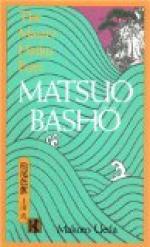|
This section contains 8,961 words (approx. 30 pages at 300 words per page) |

|
SOURCE: “Bashō as Bat: Wayfaring and Antistructure in the Journals of Matsuo Bashō,” in Journal of Asian Studies, Vol. 49, No. 2, May 1990, pp. 274-90.
In the following essay, Barnhill uses insights into social states and pilgrimage offered by the religion scholar Victor Turner to discuss Bashō's “outsiderhood” as exemplified in his travel writings. The critic contends that Bashō's particular idea of “wayfaring” is the product of a unique and complex religious vision that is rooted in Japanese literature and culture.
The Japanese writer Matsuo Bashō (1644-94) is known in the West primarily as a haiku poet. But he was also a master of Japanese prose, both haibun (short pieces of poetic prose) and kikō (travel literature). It is in his prose, particularly his travel journals, that Bashō portrays a vision and a way of life that is profoundly religious.
Although it is clear that Bashō is religious...
|
This section contains 8,961 words (approx. 30 pages at 300 words per page) |

|


